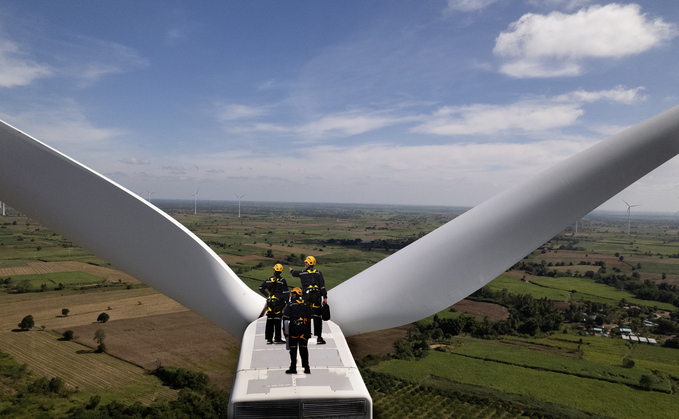
Credit: iStock
The net zero transition is ultimately a skills challenge - and currently too many businesses and governments are flunking the test
'Without labour nothing prospers.' - Sophocles
It may be the best part of 2,500 years since the Athenian playwright wrote those words, but as human society embarks on arguably the most challenging and consequential economic transition in history - the green industrial revolution - they are as pertinent as ever.
The route to future prosperity is increasingly obvious. McKinsey has estimated the global market opportunity presented by the net zero transition could be worth more than £1tr for UK companies by 2030. By the same date, the Climate Change Committee (CCC), has estimated the pursuit of net zero could deliver a net increase in jobs of up to 725,000 across the UK economy. And, within 20 years, it projects the path to net zero could drive down average household energy and motoring costs by up to £1,400 a year. All that, before you consider how a net zero economy should help safeguard the only habitable planet in the known universe from ecosystem collapse, and in doing dampen the risk of the spiralling inflation, infrastructure damage, and healthcare costs that would come with runaway climate change.
There may still be politicians who seek to argue otherwise, framing climate change as a "con" and net zero as a costly endeavour that risks destroying industry and forcing businesses and jobs abroad. Just last week Conservative leader Kemi Badenoch claimed, without evidence, that the UK's net zero targets were "destroying more jobs than they are creating" as she called for the Climate Change Act and net zero targets to be scrapped.
But such claims rarely survive contact with reality. The CBI estimates that, already today, there are around 22,000 net zero businesses - spanning range of sectors from renewable energy to green finance - employing some one million people in the UK. These companies and the jobs they provide are rapidly growing, too: last year these industries grew 10 per cent - three times faster than the rest of the economy - while generating £83bn in gross value added (GVA). Moreover, they offer better paid jobs with annual average salaries £5,600 above the average UK wage, at £43,000 a year.
Make no mistake, the signals of green prosperity are already emerging in the UK. Yet as Sophocles reminds us, none of the opportunities on offer can be grasped without painstaking work - and, crucially, a workforce with the right skills and talent to deliver the infrastructure and reforms that are so urgently needed.
And there's the rub. It is well documented that the path towards a cleaner, greener, resilient, and more prosperous future presents huge engineering, financial, and policy challenges. But the net zero transition is as much a skills challenge as anything else. And it is this very human question of how to develop the skills and build the workforce required to build a net zero economy that is at risk of being dangerously overlooked.
Indeed, as the UK charts its course towards a cleaner, more prosperous future, much of the current and projected workforce is ill prepared for the journey. There are skills shortages emerging across multiple green sectors, and the pipeline of school leavers or people switching careers, including those from carbon intensive industries, is struggling to fill the gaps.
Recent research by Green Alliance has warned the UK faces a widening green skills gap across every major sector of the economy, highlighting housing, transport, and land-use as facing the most immediate shortages. The UK is crying out for more heat pump engineers, sustainable packaging designers, and carbon accountants, yet these are still seen as relatively niche skills, rather than the bread and butter of tomorrow's economy that they are soon to become.
Meanwhile, a recent study by recruitment website Indeed found more than a quarter of UK firms are facing challenges when it comes to recruiting for sustainability-related jobs, while almost half of jobseekers admit they lack the necessary qualifications or experience for working in the green economy. The situation is even more stark for young people, with recent LinkedIn data showing just one in 20 people in the 18-24 age bracket believe they have the green skills needed to enter jobs supporting the net zero transition. In the clean energy sector alone, PwC estimated that the UK may soon face a green skills gap of 200,000 jobs.
For its part, the government is preparing to launch a new Clean Energy Jobs plan to support its recently announced push to double the number of roles in the sector to 830,000 by 2030. But delivering on that target will require a huge increase in the UK's science, technology, maths, and engineering (STEM) skills base, especially given the challenges of an ageing existing workforce and the way many other industries and countries are clamouring for the same skills required by clean energy developers.
Clearly, if the UK's net zero transition comes unstuck, it will not be for a lack of job opportunities - rather, it will be the lack of trained people to do them. And this is where the bad-faith arguments of net zero sceptics risk finding leverage: because it is all very well and good creating industries capable of supporting hundreds of thousands if not millions of new job opportunities in the burgeoning net zero economy, if British workers do not have the skills or experience to fill those roles, or the support and confidence to change career.
Get it wrong, and young people seeking rewarding career opportunities and communities reliant on declining high carbon industries will once again suffer. It is easy to see how under such a scenario it would be easier to blame clean technologies and a net zero transition that failed to deliver on their promise than the failure to deliver the training opportunities that would make new green jobs a possibility. Net zero naysayers' doom-laden prophecies of de-industrialisation and jobs being exported abroad risk being proved at last partially accurate, creating the conditions for an even more intense political backlash against climate action.
To head off this risk it is vital the net zero transition delivers the jobs it has promised - and that those jobs are well paid and rewarding. Diversity and equality of opportunity matters, too, because as Climate Change Committee CEO Emma Pinchbeck argued last week, DEI isn't just "tokenistic" but intrinsic to designing and delivering a future that works for - and gets the most out of - everyone. "If you want to build a future, you need everyone in the room to design that future," she said.
None of this will be easy. The competition for green skills is intensifying at breakneck speed. Almost every major economy in the world is now jostling for a leading role in burgeoning clean technology race, with China already streets ahead. The workers with the ability to manufacture and install heat pumps or build genuinely sustainable business models will be in hot demand.
Meanwhile, this demand will have to be met against the backdrop of the UK's ageing population, tightening restrictions on immigration, perennial challenges in developing the STEM skills base, a university funding crisis, and a fractious political battle over the UK's net zero targets. The changing labour market will also have to navigate the political, economic, and social fallout from the inevitable contraction of carbon intensive industries and the need to re-train workers to support the roll out of new clean technologies.
However, where there is challenge, there is also opportunity. The good news is every new job supported by the burgeoning green economy creates another strong advocate in their community for the transition ahead, and real world evidence of how these jobs can be hugely rewarding. There is a reason why, even despite the climate-denial and 'war' on clean energy touted by the Party's leaders Nigel Farage and Richard Tice, even some Reform UK-led councils are standing up for clean energy policies and industries: political decisions that destroy employment do not tend to be hugely popular with voters.
Every green job should be seen as a blow to scepticism and kamikaze 'business as usual' economics that are sure to feature heavily in the run up to the next election, which is now almost certain to be a de-facto referendum on net zero.
There is also a growing understanding of how to build out the green skills base, of the skills that are needed, the training and recruitment strategies that work, and the messaging that can attract more people to what is a hugely exciting and vibrant sector.
All of which is why BusinessGreen is today launching Workforce 2030, a brand-new campaign that aims to raise awareness of the looming skills crunch facing industries right across the green economy, and help advance solutions to ensure the promised employment opportunities and benefits are both capitalised on and widely shared.
Through dedicated news, analysis, case studies, and input from an array of expert voices, the campaign aims to bang the drum for ambitious policies, funding, training, and education at local, national, and corporate levels to equip the workforce of both today and tomorrow with the critical skills needed to further advance the green industrial revolution.
We therefore invite businesses, politicians, academics, think tanks, and all those working in the green economy or interested in doing so to join us in promoting the campaign and the workforce that will be needed for 2030 - because without labour, nothing prospers. It's time to get to work.
If you want to take part in the Workforce 2030 campaign or be kept updated on its progress, please get in touch.









